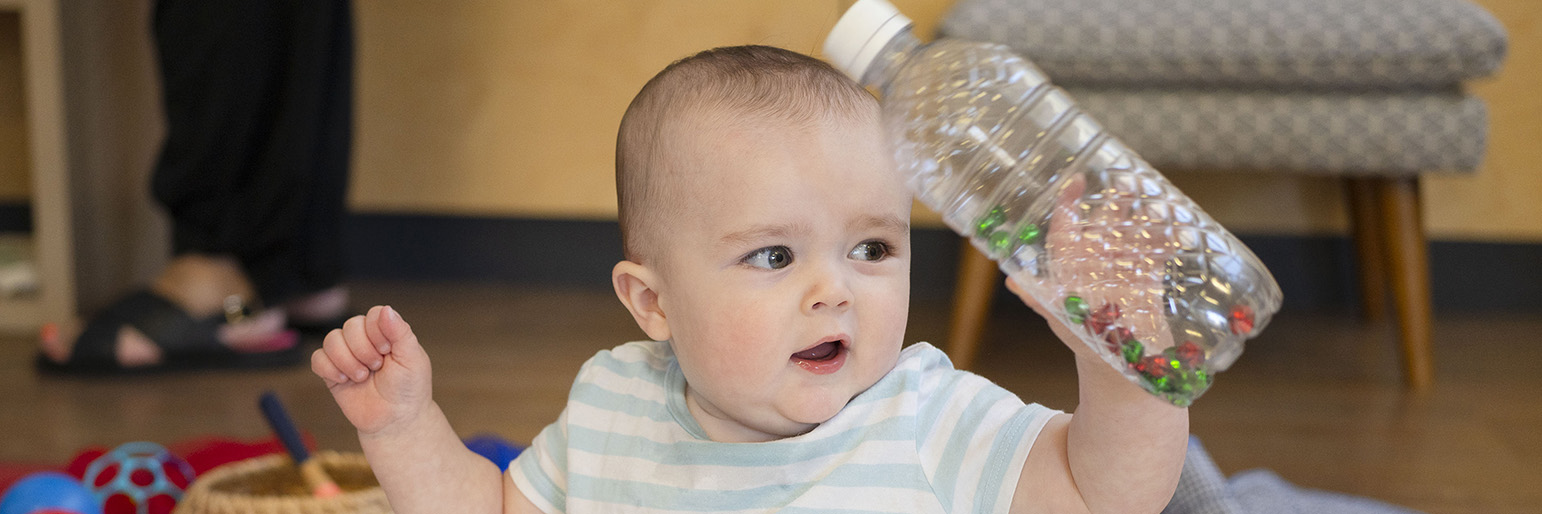Discovery bottles
Learning together
Your child is learning from everything they experience.

Activity
Ordinary plastic bottles can be turned into fascinating objects to discover and stimulate the senses of curious babies and children.
What you'll need
- Clean dry clear plastic water bottles with lids or similar
- PVA glue
- Wide tape
- Water/vegetable oil/dishwashing liquid
- Dye
- Variety of interesting things to add to your bottles:
- brightly coloured beads
- ribbons
- tin foil
- coloured paper/confetti/glitter
- small natural objects like gumnuts or seashells
- pipe cleaners
- pom-poms
- buttons
- dry rice/pasta/grains
Words to use
- Bottle, lid, top, bottom
- Loud/soft, high/low, heavy/light
- Shake, tip, upside down
- Frothy, foamy, sloshy
- Bright, metallic
- Go/stop
Questions to discuss
- What can you see in the bottle?
- What happens when you shake it?
Instructions
Fill each bottle ¼ or ½ way, with different objects or liquid to create a feast for the senses.
Grains such as rice make a lovely sound when shaken, while bright colourful bottles add visual interest as do bottles filled with foamy or glittery water.
Always glue on the lids with strong PVA glue or similar and tape over the lids for added safety.
Learning through play
Ways to develop numeracy through play
- Count how many bottles there are.
- Add items with different weights to vegetable oil, such as heavy nuts or bolts and light pins or paper clips. Do some items sink faster (speed)?
- Count items in the bottle eg three shells, one fish etc.
- Sort bottles according to colour, size or what items they contain.
- Fill a bottle with different shaped buttons.
- Make a bottle with plastic or wooden numbers.
- Use bottles as rattles – shake them fast or slow (speed).
- Shake your rattles in different positions – high/up, low/down, left, right etc.
Ways to develop literacy through play
- Talk to the child about the different objects and effects in each bottle.
- Talk about the different sounds the bottles make when you shake them – does it sound like the pitter-patter of falling rain? Does it clang and bang?
- Use bottles as shakers while you sing some favourite songs.
- What can you see in each bottle?
- What colours or shapes can you see?
- Some bottles could be used as story prompts, eg an ocean bottle with blue waves, shells and small fish could be used to tell a story about a day at the beach.
Extensions and variations to this activity
- Make some I-spy bottles with rice and small objects for the child to find. A list of items to find can be attached to the bottle for older children to locate.
- Make bottles as prompts for familiar songs eg Twinkle, Twinkle using some star sequins and some glittery water.
- Set the bottles up as bowling pins and use a tennis ball to try and knock them down. Encourage motor development by assisting children to use an underarm bowl and aim for the bottles.
- Make bottles filled with different coloured rice. Talk with children about what they see inside the bottle.
- Make rattles or shakers.
- Experiment with different objects and quantities for different sounds.
- Make some calming glitter bottles.
- Bottles can also be used to discuss science concepts with older children, eg make a bottle with metal objects and give children a powerful magnet to move objects around in the bottle.
- Make a float and sink bottle.
- Make bottles for different seasons.
Supporting parent engagement in play
Play prompts:
Sing a song and use your bottle as a shaker.
Use words such as sloshy, foamy, glittery, quiet, rustling, clanging, slow or fast to describe what you see or hear.
Parents or carers can:
- Comment on what their children are doing (say what they see).
- Talk in their home language.
- Use literacy and numeracy words (see words to use section above).
You can help families by:
- Modelling what you want them to do.
- Talking to them about the focus of the activity and what children might be learning.
- Writing up words that go with the activity.
- Making suggestions on what families can do at home.
Related Great Start activities
Great Start activities are for parents and carers to do with their children.


